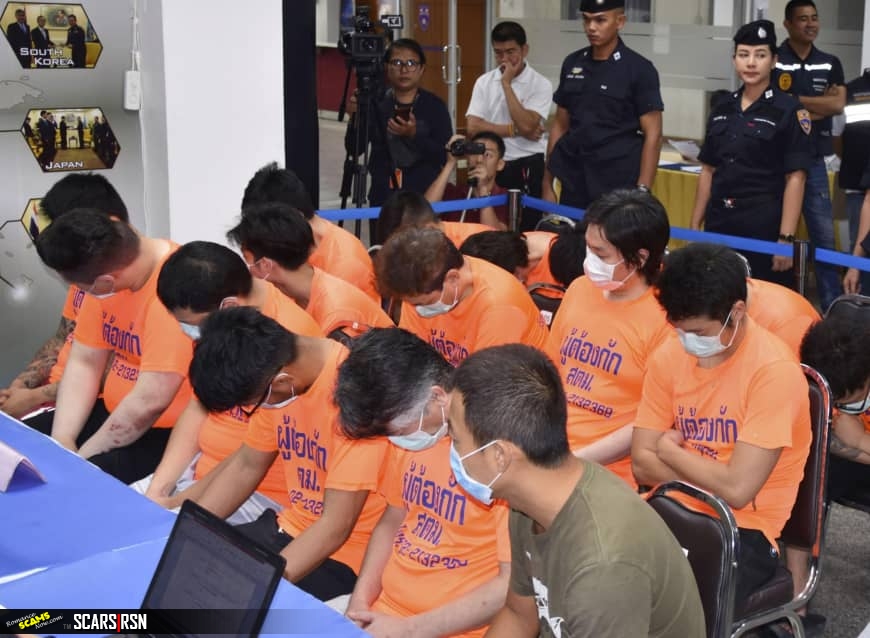SCARS™ SCAM NEWS: Battleground Japan – NHK Docudrama Reveals Telephone Scam Tactics
Japanese Now Directly Involved In Scamming
Thai police last month raided a residence in Pattaya where an alleged telephone swindling operation was taking place. They discovered 15 Japanese nationals suspected of calling retired people in Japan and fooling them into purchasing electronic money. Japanese police say they will arrest the suspects after they are deported.
The sketchy quality of the reports deepened the general confusion about these kinds of telephone scams, which have been in the news for years and continue to be an ongoing problem. It wasn’t just a lack of information on why the men were making calls from Thailand, but the whole nature of these kinds of swindles, which prey on older people who believe stories that, on the surface, sound ridiculous.
Even when media outlets go into detail on a case, readers and viewers will likely scratch their heads. The basic idea is to get a targeted person on the phone and pretend to be a close relative in serious trouble — traffic accident, work-related disaster — whose resolution requires an immediate infusion of cash. Don’t these victims recognize the voice of their own flesh and blood? How could they be so gullible?
Obviously, there was a crucial element in these kinds of reports that can’t be conveyed through conventional journalism. It required something more and, until NHK aired a docudrama on March 23 called “Sagi no Ko” (“Young Swindlers”), that extra something was missing.
One of the characters in “Sagi no Ko” is a junior high school boy who becomes a “receiver” for a cell of swindlers. It is the lowest position in the cell hierarchy. His job is to collect the cash in person after the victim agrees to resolve the fabricated problem. This task is the only face-to-face encounter in the transaction, so if the receiver is caught it is easier for him if he is a minor, since he can’t be prosecuted as an adult. Also, teenagers are more susceptible to threats from senior members of the cell.
At first, the nonlinear narrative made for perplexing viewing. It starts at the end of the story, when the receiver, Kazuto, is caught by the police while picking up an envelope of money from an elderly woman. From there, the drama ricochets back-and-forth through time, interrupted occasionally by interviews with actual former cell members who elaborate on certain points. However, this structure soon becomes useful in describing not only how such swindles are carried out, but the socioeconomic circumstances that make them successful. After Kazuto and his 23-year-old monitor, Toyama, are arrested, the narrative proceeds through their court trials and recollections of how they became involved.
Cells are set up by crime bosses and installed in rental spaces completely isolated from the outside world. The cells work independently, with the top earners cold calling numbers from lists of names purchased from legally dodgy data supply companies. The callers’ success depends on their ability to improvise, to adapt instantly to something in the interlocutor’s voice and then lead the victim into the trap they’re setting. Once the victim is hooked, the receiver goes to the person’s house to collect the cash as the caller keeps reassuring the victim over the phone. A monitor watches from a distance, on the lookout for police.
The cell is self-contained and only contacts the boss when the scam is complete. The cell chief gives all their proceeds to the boss, who then removes a large portion and gives it back to the cell. The chief decides how much each member is paid.
Although there are still questions NHK did not answer (for instance, what is to prevent the cell from shorting the boss?), it’s clear from the amount of money these operations take in that the structure is very effective, especially in terms of thwarting police. Cells are nimble and move all the time, leaving no trace of their previous existence to provide the authorities with clues.
Most cell members are youths disillusioned with or left off the education track, a cliche that NHK exploits, but it does provide a plausible rationale. When the crime boss recruits, he says he is redistributing wealth being hoarded by retired seniors, a claim that isn’t far off the mark.
For years the government has been unsuccessfully trying to get the savings “sleeping” in older people’s possession into circulation. This explanation alleviates some of the self-reproach incurred when cheating people of their life savings, but the main appeal is the group dynamic of the cell. Kazuto doesn’t care so much about the money he’s making. As he tells an official at his detention center, he liked scamming because it was fun to do things with people he called his friends.
Callers can go through hundreds of names before finding someone who doesn’t automatically hang up when they pretend to be a relative, and usually, it’s because the relationship with that person is fraught with remorse. An effective caller takes advantage of that remorse and, in the drama, the couple who falls for the scam is estranged from their son, so when “he” calls for help, they see a means of reconciliation. After the scam is revealed, however, they are the targets of public derision. The husband commits suicide. The wife survives in a fog of incomprehension, still believing she talked to her son on the phone. NHK’s dramatic license, in this case, is not only justified but necessary, as it points up the emotional manipulation at the heart of the swindle.
Also justified was the melodramatic climax, when the chief of the cell, Daisuke, wracked with guilt, attempts to return the money to the widow and then turns himself in. In court, the prosecution accuses him of cynically blaming society for his transgression because he was raised in poverty by a single mother. So many people in the same situation “properly” work hard to overcome their situation.
People like me can’t get ahead like you, Daisuke tells the court, no matter what we do.
For that reason, he says, this kind of crime will always be around.
SCARS™ Team
A SCARS Division
Miami Florida U.S.A.
TAGS: Scam News, News About Scams, News About Scammers, Global Scamming News, Japanese Scammers, Thai Scammers, Japan, Scamemrs Arrested, Thailand, Phone Scams,
END
MORE INFORMATION
– – –
Tell us about your experiences with Romance Scammers in our Scams Discussion Forum on Facebook »
– – –
FAQ: How Do You Properly Report Scammers?
It is essential that law enforcement knows about scams & scammers, even though there is nothing (in most cases) that they can do.
Always report scams involving money lost or where you received money to:
- Local Police – ask them to take an “informational” police report – say you need it for your insurance
- Your National Police or FBI (www.IC3.gov »)
- The SCARS|CDN™ Cybercriminal Data Network – Worldwide Reporting Network HERE » or on www.Anyscam.com »
This helps your government understand the problem, and allows law enforcement to add scammers on watch lists worldwide.
– – –
Visit our NEW Main SCARS Facebook page for much more information about scams and online crime: www.facebook.com/SCARS.News.And.Information »
To learn more about SCARS visit www.AgainstScams.org
Please be sure to report all scammers HERE » or on www.Anyscam.com »
Legal Notices:
All original content is Copyright © 1991 – 2020 SCARS All Rights Reserved Worldwide & Webwide. Third-party copyrights acknowledge.
SCARS, RSN, Romance Scams Now, SCARS|WORLDWIDE, SCARS|GLOBAL, SCARS, Society of Citizens Against Relationship Scams, Society of Citizens Against Romance Scams, SCARS|ANYSCAM, Project Anyscam, Anyscam, SCARS|GOFCH, GOFCH, SCARS|CHINA, SCARS|CDN, SCARS|UK, SCARS Cybercriminal Data Network, Cobalt Alert, Scam Victims Support Group, are all trademarks of Society of Citizens Against Relationship Scams Incorporated.
Contact the law firm for the Society of Citizens Against Relationship Scams Incorporated by email at legal@AgainstScams.org







Leave A Comment